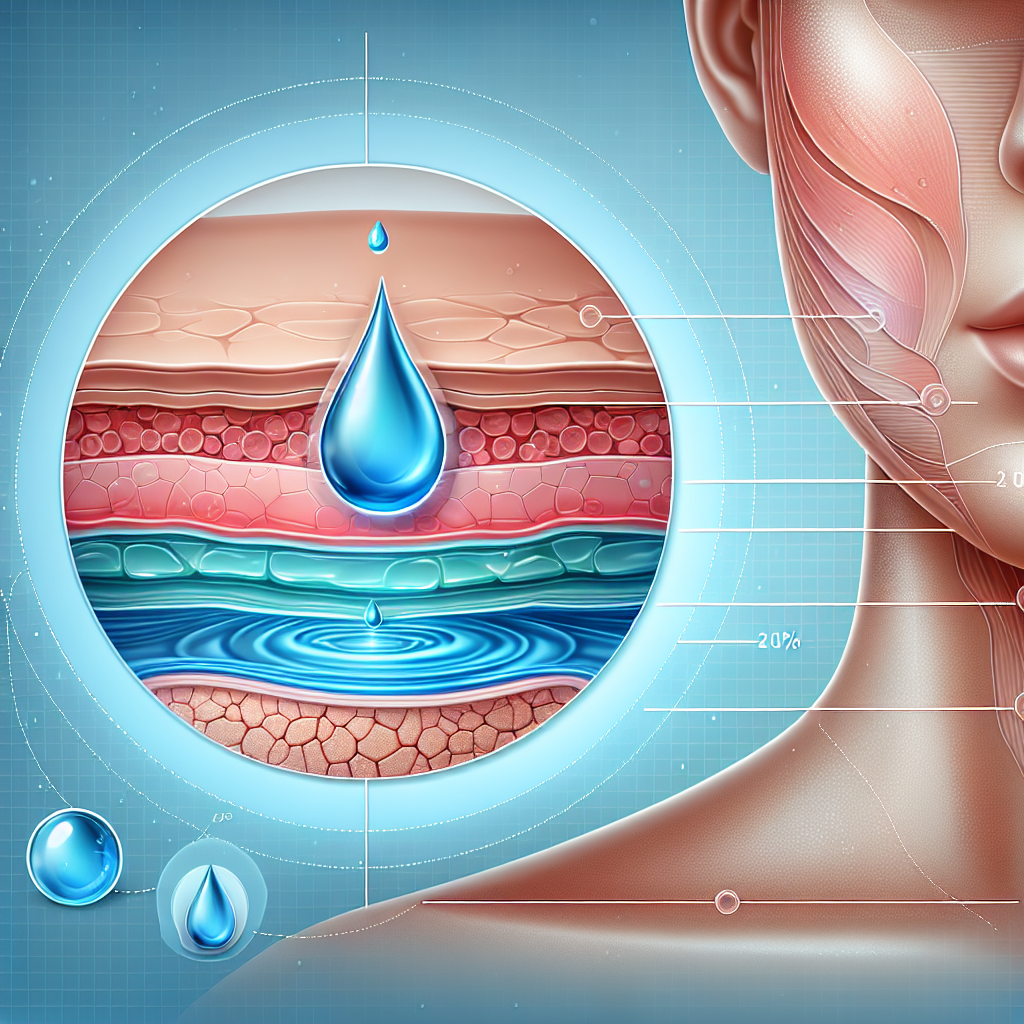The Role of Hydration in Skin Health
Skin, the body’s largest organ, serves as a multifaceted barrier protecting us from the external environment. Among its many roles, maintaining proper hydration levels is critical for skin health. Hydration not only influences how our skin looks and feels but also affects its functionality on a molecular level. This article delves into the intricate relationship between hydration and skin health, exploring how adequate moisture can enhance skin vitality and resilience.
The Importance of Hydration for Skin
Proper hydration is vital for maintaining the skin’s barrier function, elasticity, and overall appearance. The stratum corneum, the outermost layer of the skin, plays a crucial role in retaining moisture. When this barrier is compromised, the skin can become dry, flaky, and more susceptible to irritation and infections. Here are some key aspects of how hydration impacts skin health:
1. Barrier Function
The skin barrier comprises lipids and proteins that prevent water loss and protect against harmful substances. Adequate hydration supports this barrier, ensuring it remains intact and functional. When the skin is well-hydrated, it can better defend against environmental aggressors like pollutants and toxins.
2. Elasticity and Firmness
Hydrated skin is more elastic and firm. Water is essential for maintaining the skin’s elasticity, as it helps in the production of collagen and elastin. These proteins are responsible for keeping the skin plump and youthful. Dehydration can lead to a loss of elasticity, resulting in sagging and wrinkles.
3. Cellular Functions
Water is vital for the proper functioning of skin cells. It aids in the transportation of nutrients to the cells and the removal of waste products. Hydrated cells function optimally, which is crucial for maintaining healthy, glowing skin.
4. Improved Appearance
Hydrated skin appears more radiant and smooth. Dry skin can look dull and tired, whereas adequately moisturized skin has a natural glow. Hydration helps to reduce the appearance of fine lines and wrinkles, giving the skin a more youthful appearance.
How to Maintain Skin Hydration
Maintaining skin hydration involves both internal and external measures. Here are some effective strategies to keep your skin well-hydrated:
1. Drink Plenty of Water
The most obvious way to hydrate your skin is by drinking sufficient water. Aim for at least 8-10 glasses of water a day. This helps to keep your entire body, including your skin, hydrated from the inside out.
2. Use Moisturizers
Moisturizers are essential for trapping moisture in the skin. Look for products containing ingredients like hyaluronic acid, glycerin, and ceramides, which are known for their hydrating properties.
3. Avoid Hot Showers
Hot water can strip the skin of its natural oils, leading to dryness. Opt for lukewarm showers and limit your bathing time to avoid excessive moisture loss.
4. Humidifiers
Using a humidifier, especially during the dry winter months, can add moisture to the air and prevent your skin from becoming dry and flaky.
5. Eat Hydrating Foods
Incorporate foods with high water content into your diet, such as cucumbers, oranges, and watermelon. These foods can help to boost your overall hydration levels.
6. Limit Alcohol and Caffeine
Alcohol and caffeine can dehydrate the body, including the skin. Try to limit your intake of these beverages or compensate by drinking extra water.
Hydration Myths and Facts
Myth: Drinking Water is the Only Way to Hydrate Your Skin
Fact: While drinking water is crucial, it is not the only method for hydrating your skin. Using moisturizers, eating hydrating foods, and maintaining a good skincare routine are equally important.
Myth: Oily Skin Doesn’t Need Moisturizer
Fact: Oily skin can still be dehydrated. Using a lightweight, non-comedogenic moisturizer can help maintain the skin’s balance without clogging pores.
Myth: You Don’t Need Moisturizer if You Drink Enough Water
Fact: External hydration is just as important as internal hydration. Moisturizers help to seal in the moisture and protect the skin barrier.
FAQs on Hydration and Skin Health
Q: How much water should I drink for optimal skin hydration?
A: It is generally recommended to drink at least 8-10 glasses of water a day. However, individual water needs can vary based on factors like body size, activity level, and climate.
Q: Can using a moisturizer really make a difference in my skin’s hydration?
A: Yes, moisturizers can significantly improve your skin’s hydration levels by trapping moisture in the skin and preventing water loss. Look for ingredients like hyaluronic acid and glycerin for the best results.
Q: Is it possible to over-hydrate my skin?
A: Over-hydration is rare but can occur if you apply too many heavy products that clog the pores. Stick to a balanced skincare routine suitable for your skin type.
Q: What are the signs of dehydrated skin?
A: Signs of dehydrated skin include dryness, flakiness, dullness, and a feeling of tightness. You may also notice fine lines and a rough texture.
Q: Can diet impact my skin’s hydration levels?
A: Absolutely. Eating a diet rich in water-dense fruits and vegetables can help to maintain your skin’s hydration levels. Foods high in antioxidants, vitamins, and minerals can also support overall skin health.
Q: Are there specific ingredients I should look for in hydrating skincare products?
A: Yes, look for ingredients like hyaluronic acid, glycerin, ceramides, and aloe vera. These ingredients are known for their hydrating and moisture-retaining properties.
Q: How often should I apply moisturizer?
A: It is generally recommended to apply moisturizer twice a day—once in the morning and once before bed. However, frequency can vary depending on your skin type and the climate you live in.
In conclusion, hydration plays a pivotal role in maintaining healthy, radiant skin. By understanding how to properly hydrate both internally and externally, you can enhance your skin’s appearance and functionality. Remember, a holistic approach—combining adequate water intake, a balanced diet, and a tailored skincare routine—is key to achieving and maintaining optimal skin hydration.

